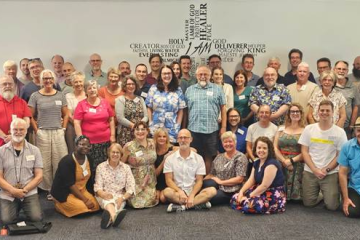“Open our ears to hear and guide our steps to follow”
Reading: Mark 9: 30-37
A well-known and I suspect much loved hymn begins with the lines, “O Sabbath rest by Galilee, O calm of hills above”. But it wasn’t like that in Galilee in the time of Jesus, it wasn’t like that at all.
Jesus’ ministry, his life, death and resurrection took place under military occupation out on the edge of the Roman Empire. Galilee and Judea were notorious for banditry, and guerrilla warfare. It was often hard to tell the difference. Most of the population was subject to economic oppression by absentee landlords, a character who shows up in several of Jesus’ parables. It was a dangerous and unjust world, in which the Romans exercised power without much restraint.
By the time Mark wrote his gospel, probably shortly after the Jewish-Roman War, which ran from 66-70 AD, the Jewish people had been through a whole other world of pain. The Romans’ military response to the Jewish revolt began in Galilee before moving on to the siege and destruction of Jerusalem. The Roman campaign in Galilee was characterised by murder, rape, plunder, and the burning of villages and country towns. Much of the surviving population was sold into slavery. To make things worse, during the early stages of the war the residents of Galilee were caught in a conflict between different Jewish military forces jockeying for position.
It is not hard to imagination refugees, largely women and children fleeing the region not only because of the war but because of famine as the crops were destroyed or requisitioned by both the Roman army and Jewish guerrillas. To put this in our current context think the people of Afghanistan, Syria and Iraq with their recent experience of military campaigns that have rampaged across the countryside with villagers caught between guerrillas and the forces of the occupying powers. Refugees then, and refugees now.
It is against this shared background that we need to read Mark’s Gospel. The small communities of disciples hearing Mark’s Gospel read to them for the first time would have had this military campaign and its destructive consequences fresh in their minds. If they hadn’t experienced the war directly, they would have had families and friends who had. Listening to Mark’s account of the ministry and teaching of Jesus, early Jewish and Gentile believers would have found themselves making connections and drawing comparisons between Jesus’ nonviolent campaign inaugurating God’s reign, and the oppressive violence and destruction of the campaign of the Roman general Vespasian who would go on to become ruler of the Roman empire and thus in a significant way understood as divine.
Mark wrote his gospel in Galilee against this background of war and social dislocation in a style which is terse and tightly focused. If social media had been around in his day Mark would have been on Twitter. No question about it. I suggest this because Twitter is a format in which every word counts. In his tight terse writing Mark provides his hearers with hints and suggestions about the two contrasting campaigns in Galilee. There was that of Jesus in his announcement and practice of the peaceful kingdom of God and that of the military destruction by the Roman general Vespasian. For those of us coming later to the Gospel we will need to take care to unpack Mark’s terse brevity to gain an understanding of the significance of what he has to say for ourselves.
Today’s passage from Mark’s gospel draws our attention to the fact that Jesus is on his way through Galilee, not a place associated with ethnic and religious purity and orthodoxy, as well as being a location that had been treated roughly to say the least by the Romans. In telling the story of Jesus Mark suggests a stark contrast if not a profound conflict between the characteristics of the life that Jesus is calling his disciples to lead with regard to issues of wealth, status and power, and the characteristics exhibited by those who were in power in the Roman empire. The Roman culture in its approach to politics and economics stood in stark contrast to that displayed by Jesus. In the Roman empire the authorities and retainers were self-oriented in that they wanted to ‘acquire the whole world’ and to accumulate wealth for themselves. They desired to be ‘great’ and to be ‘first’ among other humans.
Mark in today’s passage doesn’t spend too long on the disciples’ difficulty in grasping where Jesus path would lead and what his calling said about God’s kingdom. Mark simply reminds us again of the conflict between Jesus and the disciples, a conflict narrated in more detail in Mark 8: 31-33 where Peter rebukes Jesus for talking about rejection and death and Peter in turn is rebuked by Jesus. The disciples and Jesus were clearly not on the same page. The disciples have in mind a trajectory of success for Jesus that is shaped by their assumptions about achieving power in Jerusalem as followers of the Messiah.
The picture of the disciples that Mark paints for us in this passage is one in which our temptation is to respond by simply stopping with our first hot take on the situation that the disciples just don’t get Jesus and what he is about. Their slowness in getting the message is opposed of course to ourselves who are confident that we really understand with the benefit of hindsight what is going on. It seems easy to conclude that unlike the disciples we really get Jesus’ message. Jesus is on his way to be killed and that in the end, he’ll rise in three days. The disciples after all have been looking for a Messiah who was definitely not going to be killed – who was going to be vindicated by God by overthrowing the Romans and their occupying army.
It is easy for to say yes, we get that Jesus is not on the trajectory that the disciples expected that would lead to towards status, power and success and that he is going to be killed and that he will rise again. Jesus is clear that he is not going to be installed by God in a position of power that would parallel the structure and operation of the Roman empire. So, we know better than the disciples but by the time we have finished with this passage. I suggest that we will have reason to step back from assuming that we are ahead of the disciples in understanding and faithfully following Jesus’ call.
Mark is writing to a church whose members were grappling with the difficulty of understanding Jesus’ ministry and call to them and coming to grips with many of the implications of Jesus’ call to discipleship. We need to read this passage not as a church that is standing above the disciples, superior in our understanding of Jesus’ ministry and call to the church. We need to read this passage from below from the position of the disciples who hadn’t got the memo yet, who are continuing to struggle with grasping what the message and what the call of Jesus is all about.
Mark makes it clear that the disciples are in avoidance mode. They don’t want to have Jesus unpack what this teaching about being killed and rising again means for them. Instead, the disciples shift their attention to debating questions of status and honour among themselves. Who is going to come out on top in the impending coup in Jerusalem when they become lead actors in the messianic kingdom that they are anticipating? Their discussion is not about spirituality, but about politics and power and the models that the disciples reach for in thinking about those issues were those of the occupying imperial power, that is to say Rome not that advocated by Jesus.
Jesus when they come to settle down after a day on the road gets the disciples together and sets out a brief but challenging teaching by Jesus for those who would follow him on the question of greatness and the implication of power, honour and status that went with it. The ultimate choice of the cross that Jesus is referring to here must be reproduced in the life of the community of disciples. Jesus is going to suffer at the hands of the Roman empire. The pattern and culture of the life of the community of disciples those who are following him is going to be consistent with the pattern that he has set.
So here we come to the heart of the matter in Jesus’ rebuke to the disciples. “Whoever wants to be first must be last of all and be servant of all.” If your ambition is to be first in the kingdom you are already way off track. That’s not what you should be focussing on. This statement by Jesus is one that we have worked hard on reinterpreting taking the hard edge off it particularly for those who consider themselves to be leaders and in power within the church. This is a passage addressed in the first instance to men who saw themselves as leaders in the Jesus movement. Male leaders in the Jesus movement have had difficulty coming to grips with this direction about the use of power, not only at this point but for the next wo millennia.
There is an ambiguity in the possible readings of this passage that I will try and unpack here. We tend to read it as saying if you want to be first the way to get there is to be last and to be a servant of all – that is the path to the top goes by stepping down to the bottom and becoming a servant. This can be read as a direction as to how to actually to get to the top, this is the pathway, this is the technique for those who want to exercise power. On this reading the emphasis is still on getting to the top, by a paradoxical and not obvious path to be sure but it is nonetheless about getting up to the top in the Jesus movement. But the passage I suggest can be read another way, that if you are interested in being first you need to learn how to be otherwise and this can be learnt by becoming a servant.
If you want to be first Jesus says, you are following the path of the Romans, you are being shaped by their culture and you need to learn otherwise. The scramble for power and status is not the path for those who would be followers of Jesus. So, if you want to be first, forget it. You have the wrong mindset. Jesus in not laying down a law here. Rather he is offering us a therapy a way of unlearning the assumptions of the empire. We need to stop thinking about power and status but let our minds be shaped by an attitude and practice of service. The path to becoming a “servant of all”, is to become energized by humbly drawing near to the God of resurrection, in which we soberly rehearse death—death to self and to the will to power—because death is not the end. To claim the vindication of resurrection without journeying through death is an illusion.
Jesus then moves on to perform a show and tell by taking a little child into his arms an action that provides us with another critique of the Roman assumptions of power and status. Children in the time of Jesus were at the bottom of the social and economic scale in terms of their lack of status and lack of rights. Children were nonentities, yet Jesus says in welcoming them in his name we not only welcome him but going beyond that we are welcoming the one who sent him. To turn it around in not welcoming children we are failing to welcome Jesus and more seriously we fail to welcome the one who sent him. This saying is a direct challenge to the disciples’ concern with their status.
When we bring this saying of Jesus into the present moment, when we read it in the light of what was revealed about the treatment of children not only by church institutions and those designated as pastoral leaders in a range of Christian denominations but also in the covering up of their abuse this becomes a hard and confronting saying. Let me spell it out so that we are confronted with it in its most stark form.
What the leaders of those churches did to children in not hearing and responding to their stories of abuse was an act of rejection of Jesus and a rejection of the one who sent him. The church in this action turned its back on Jesus and its back on God all in the cause of trying to maintain our status and privilege. Churches in their abuse of children and its coverup were complicit in abuse of Jesus. This seems a hard and confronting saying but Jesus teaching as reported by Mark cannot be avoided.
If today we as a community of disciples do not receive the nonentity the one who has no power, the one who has no status we are not receiving Jesus, however pious and orthodox we might think we are. Jesus here says nothing of using orthodoxy and belief. The test he invokes is one of receiving those who the culture, the society regard as nobodies. Christos Tsiolkas in his novel Damascus in a confronting reimagining of the life of the apostle Paul and the early Christians makes clear how much against the grain of the prevailing culture the practice of receiving those without status by the early Christians was and how utterly offensive it was to those who had status and power. Tsiolkas has seen more clearly than many church leaders what was so distinctive about the early Jesus movement in the radical receptiveness of its life and its rejection of status and privilege in its practice of community.
Jesus here is suggesting a practice of hospitality that is truly at odds with the status seeking culture of the Roman empire. There is an ethos of trust and vulnerability here that was at odds with the destructiveness of a self-centred pursuit of power.
As it did then the message of Jesus is one which still cuts across the grain of our culture. It challenges us to an ethos of service and welcome. We need to let go of an attitude of fear of those who are different. a fear of the stranger, the refugee who came here on boats, fear of facing the truth of colonial invasion and the claims of the indigenous people calling us to acknowledge that the sovereignty over the land was never ceded. Within the Christian community Jesus’ call to receive those without status and power challenges a widespread fear in many churches of welcoming those who are other and who challenge our preconceptions of sexuality and gender.
This challenge to welcome the vulnerable the powerless has I think a word to say to us in this time for us as a congregation and the Baptist community more widely. Do we want to receive Jesus and the one who sent him? The disciples found it hard to do so then. We find it hard to do so now. In reading this passage we should not place ourselves above the disciples but recognise that the challenge of Jesus to them remains the challenge to us today to undergo individually and collectively the therapy of service so as to overcome our need to be the first.


